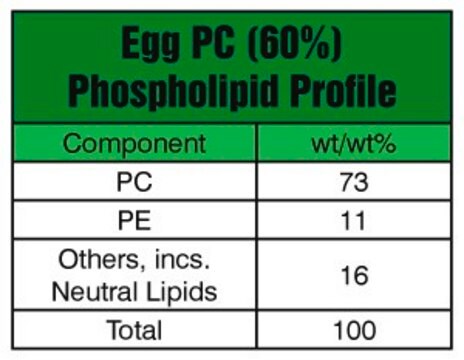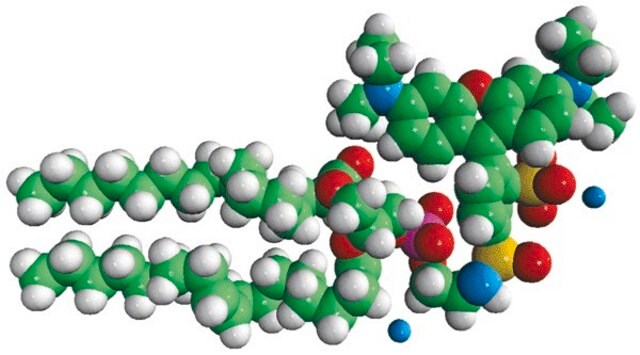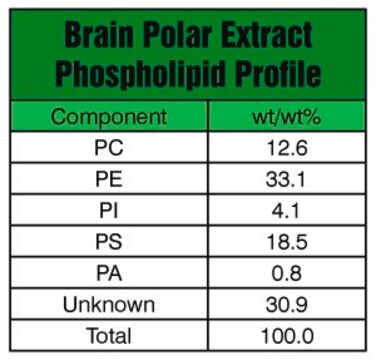840051C
Avanti
Egg PC
Avanti Research™ - A Croda Brand
Synonyme(s) :
Egg PC 99%
About This Item
Produits recommandés
Description
L-α-phosphatidylcholine (Egg, Chicken), chloroform
Essai
>99% (TLC)
Forme
liquid
Conditionnement
pkg of 1 × 2.5 mL (840051C-25mg)
pkg of 2 × 20 mL (840051C-1g)
pkg of 2 × 4 mL (840051C-200mg)
pkg of 5 × 4 mL (840051C-500mg)
Fabricant/nom de marque
Avanti Research™ - A Croda Brand
Concentration
10 mg/mL (840051C-25mg)
25 mg/mL (840051C-1g)
25 mg/mL (840051C-200mg)
25 mg/mL (840051C-500mg)
Type de lipide
phospholipids
phosphoglycerides
Conditions d'expédition
dry ice
Température de stockage
−20°C
Chaîne SMILES
[P](=O)([O-])(OC[C@H](OC(=O)CCCCCCC\C=C/CCCCCCCC)COC(=O)CCCCCCCCCCCCCCC)OCC[N+](C)(C)C
InChI
1S/C42H82NO8P/c1-6-8-10-12-14-16-18-20-21-23-25-27-29-31-33-35-42(45)51-40(39-50-52(46,47)49-37-36-43(3,4)5)38-48-41(44)34-32-30-28-26-24-22-19-17-15-13-11-9-7-2/h20-21,40H,6-19,22-39H2,1-5H3/b21-20-/t40-/m1/s1
Clé InChI
WTJKGGKOPKCXLL-VYOBOKEXSA-N
Description générale
Application
- in the preparation of unilamellar vesicles
- in liposome preparation for proteoliposome reconstitution
- as a liposome component in lipid transfer assay
Actions biochimiques/physiologiques
Conditionnement
Informations légales
Souvent commandé avec ce produit
Mention d'avertissement
Danger
Mentions de danger
Classification des risques
Acute Tox. 3 Inhalation - Acute Tox. 4 Oral - Aquatic Chronic 3 - Carc. 2 - Eye Irrit. 2 - Repr. 2 - Skin Irrit. 2 - STOT RE 1 - STOT SE 3
Organes cibles
Central nervous system, Liver,Kidney
Code de la classe de stockage
6.1D - Non-combustible acute toxic Cat.3 / toxic hazardous materials or hazardous materials causing chronic effects
Classe de danger pour l'eau (WGK)
WGK 3
Point d'éclair (°F)
Not applicable
Point d'éclair (°C)
Not applicable
Listes réglementaires
Les listes réglementaires sont principalement fournies pour les produits chimiques. Seules des informations limitées peuvent être fournies ici pour les produits non chimiques. L'absence d'indication signifie qu'aucun des composants n'est répertorié. Il incombe à l'utilisateur de s'assurer de l'utilisation sûre et légale du produit.
EU REACH Annex XVII (Restriction List)
Faites votre choix parmi les versions les plus récentes :
Certificats d'analyse (COA)
It looks like we've run into a problem, but you can still download Certificates of Analysis from our Documents section.
Si vous avez besoin d'assistance, veuillez contacter Service Clients
Déjà en possession de ce produit ?
Retrouvez la documentation relative aux produits que vous avez récemment achetés dans la Bibliothèque de documents.
Les clients ont également consulté
Global Trade Item Number
| Référence | GTIN |
|---|---|
| 840051C-1G | 4061838169723 |
| 840051C-200MG | 4061838169730 |
| 840051C-25MG | 4061838169747 |
| 840051C-500MG | 4061838169754 |
Notre équipe de scientifiques dispose d'une expérience dans tous les secteurs de la recherche, notamment en sciences de la vie, science des matériaux, synthèse chimique, chromatographie, analyse et dans de nombreux autres domaines..
Contacter notre Service technique


















